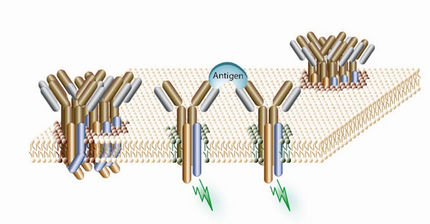New analysis of data from TNF-alpha AutoVac(TM) clinical trial shows clear antibody levels
Advertisement
A new analysis shows that a TNF-alpha vaccine based on Pharmexa's AutoVac(TM) technology induced antibodies in approximately half of the patients in a phase I/II trial conducted in London in 2000-2001 in 28 cancer cachexia patients. These results show that the AutoVac(TM) technology, as expected, can induce antibodies in patients against disease-associated proteins like TNF-alpha. Pharmexa is developing a new TNF-alpha AutoVac(TM) vaccine with significant improved characteristics, which is expected to enter clinical trials in 2005.
For the first time, Pharmexa recently got access to blood samples from 21 of the 28 patients that participated in a clinical phase I/II trial conducted in London in 2000-2001 with a TNF-alpha AutoVac(TM) vaccine based on Pharmexas AutoVac(TM) technology. The TNF-alpha AutoVac(TM) vaccine was tested in patients suffering from cachexia, a pathological weight loss condition associated with an advanced stage of cancer, in which TNF-alpha is believed to play a central role in the disease mechanisms. The non-profit organisation Cancer Research Campaign and Professor Charles R. Coombes in London carried out the trial, sponsored by Ferring, Pharmexa's former licensing partner. The analysis performed at that time on blood samples from these patients showed no significant levels of antibody formation against TNF-alpha, and Ferring subsequently decided to transfer the project to Business Development Finance (V?kstFonden), who was a co-sponsor of the project.
In August 2002, Pharmexa bought back the TNF-alpha AutoVac(TM) project from Business Development Finance.
Following this, Pharmexa showed that the two TNF-alpha AutoVac(TM) vaccine molecules used in the clinical trial in 2000-2001 did not mimic the natural human TNF-alpha molecule's structure. Pharmexa concluded that this was the reason why no antibodies were induced capable of neutralising the disease causing effect of TNF-alpha in the patients. On this basis, Pharmexa designed a number of new TNF-alpha molecules and has now selected one molecule and taken it into preclinical development. It has been demonstrated that this molecule to a high degree mimics the natural human TNF-alpha molecule and can, as opposed to the previous investigated molecules, induce neutralising antibodies in monkeys. Clinical trials with Pharmexa's new TNF-alpha vaccine are expected to commence in 2005. Pharmexa is furthermore actively seeking a partner to the project and are in discussions with several interested companies.
As a result of the recent access to and analysis of the original blood samples from the phase I/II cachexia trial, Pharmexa now know that the analysis method used under the clinical study only measured antibodies reacting with the natural human TNF-alpha molecule's structure. However, since the original vaccine did not have these characteristics, the absence of such antibodies in the patients' blood samples was not surprising. If instead the blood samples are analysed using a method that in addition examines antibodies against the form of TNF-alpha present in the vaccine (denatured TNF-alpha), then the blood samples give rise to a very different conclusion: Approximately half of the patients show clear antibody responses against this form of TNF-alpha and there seems to be signs of a dose-response relation. This may indicate a sub-optimal vaccine dose was used in the original clinical trial.
S?ren Mouritsen, Chief Executive Officer of Pharmexa says: "These results constitute a very important milestone for Pharmexa, since they show for the first time that the AutoVac(TM) technology can induce antibody responses in patients. Additionally, and this is also in line with our preclinical studies, the results indicate that it is possible to optimise the antibody levels by varying the vaccine dosage. Last but not least, the results once again highlight the importance of the AutoVac(TM) vaccine molecules preserving a structure that is very close to the natural human molecules. If not, antibodies may be generated, but they will not have the desired therapeutic effect. This is an issue we have given a lot of attention in the last three years, so that we today have made sure that our new TNF-alpha AutoVac(TM) vaccine, as well as our breast cancer-, Alzheimer's - and bone degradation vaccines, do not suffer from these problems".
Other news from the department business & finance
Most read news
More news from our other portals
See the theme worlds for related content
Topic world Antibodies
Antibodies are specialized molecules of our immune system that can specifically recognize and neutralize pathogens or foreign substances. Antibody research in biotech and pharma has recognized this natural defense potential and is working intensively to make it therapeutically useful. From monoclonal antibodies used against cancer or autoimmune diseases to antibody-drug conjugates that specifically transport drugs to disease cells - the possibilities are enormous

Topic world Antibodies
Antibodies are specialized molecules of our immune system that can specifically recognize and neutralize pathogens or foreign substances. Antibody research in biotech and pharma has recognized this natural defense potential and is working intensively to make it therapeutically useful. From monoclonal antibodies used against cancer or autoimmune diseases to antibody-drug conjugates that specifically transport drugs to disease cells - the possibilities are enormous


















































